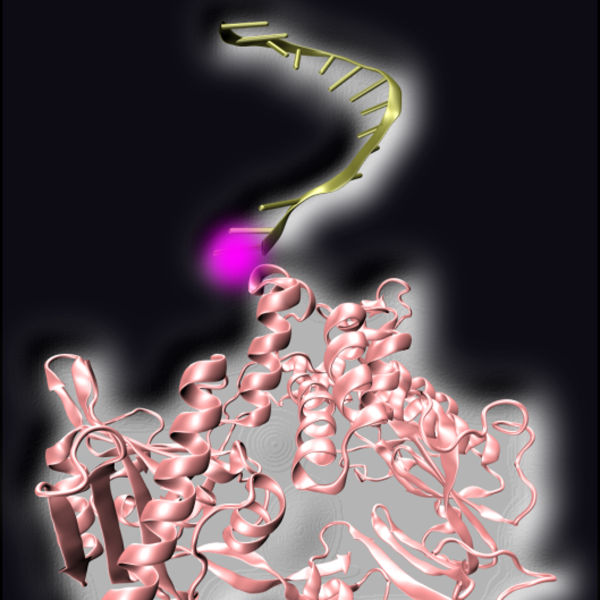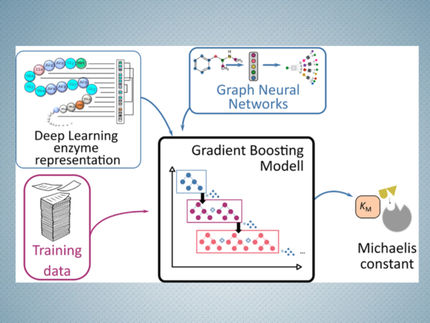PCR: Activated by light
New approach could help to significantly improve diagnostic tests based on PCR
DNA polymerases and other enzymes that modify DNA are essential tools in biotechnology and diagnostics. They are the key component for COVID-19 diagnostics by PCR. As useful as they are, DNA processing enzymes often have important flaws. Some of them display significant activity during the preparation of the samples, while others have nasty secondary activities. Both can lead to loss of specificity and sensitivity, which has to be avoided in a diagnostic test.

© Vera / LMU
The trick is to block any type of enzymatic activity until the assay starts. For diagnostics tests based on PCR, such as the above mentioned test for COVID-19, the solution is the development of a hot-start enzyme, which shows no activity until a high activation temperature is reached. The main drawback of these hot-start approaches is that they cannot be used for enzymes that are damaged by heat, says LMU-biochemist Andrés Vera. “Besides, the design of a hot-start enzyme is tedious and the exhausting design process has to be repeated for each new enzyme that we want to engineer.”
Together with Merve-Zeynep Kesici from the group of Prof. Philip Tinnefeld at the Department of Chemistry of LMU Andrés found a way around these problems designing light-start enzymes. Their light-start enzymes are blocked until a pulse of UV light reactivates them. “Light-controlled enzymes have been around for quite a while, but what makes our approach unique is that it can be applied to virtually any DNA processing enzyme. In the past you always needed very detailed information on how your enzyme works and you were never sure that you would come with a smart way to block the enzyme and reactivate it with light”, says Vera, leader of the project.
In their approach, the researchers bound a piece of DNA to the enzyme itself, which over-compete any other enzymatic substrates rendering the enzyme effectively inactive (including their secondary activities). The light pulse is used to cut the DNA attached to the enzyme resulting in a 100% active enzyme. The main advantage is that the mechanism should work for a broad range of DNA biding enzymes regardless of their specific way of action.
To prove their point the researchers produced four light-activatable versions of different DNA processing enzymes. Among them was the so called Phi29 DNA polymerase, an enzyme broadly used to amplify whole genomes but too heat-sensitive to be adapted to hot-start methods. Moreover, the team showed light-start PCR and proved that their DNA polymerases were as good or better compared to commercial hot-start enzymes for PCR. Philip Tinnefeld is positive about this new development: “This is definitely going to help to produce better enzymes for biotechnological and diagnostics use. Besides, current real-time PCR machines already incorporate light sources and they could be easily modified to bring these enzymes to the market anytime soon.”
Original publication
Other news from the department science

Get the life science industry in your inbox
By submitting this form you agree that LUMITOS AG will send you the newsletter(s) selected above by email. Your data will not be passed on to third parties. Your data will be stored and processed in accordance with our data protection regulations. LUMITOS may contact you by email for the purpose of advertising or market and opinion surveys. You can revoke your consent at any time without giving reasons to LUMITOS AG, Ernst-Augustin-Str. 2, 12489 Berlin, Germany or by e-mail at revoke@lumitos.com with effect for the future. In addition, each email contains a link to unsubscribe from the corresponding newsletter.
Most read news
More news from our other portals
See the theme worlds for related content
Topic World PCR
This groundbreaking and highly versatile molecular technique of PCR allows us to amplify tiny amounts of genetic material on a large scale and analyze them in detail. Whether in medical diagnostics, forensic DNA analysis or research into genetic diseases - PCR is an indispensable tool that gives us deep insights into the world of DNA. Immerse yourself in the fascinating world of the polymerase chain reaction (PCR)!

Topic World PCR
This groundbreaking and highly versatile molecular technique of PCR allows us to amplify tiny amounts of genetic material on a large scale and analyze them in detail. Whether in medical diagnostics, forensic DNA analysis or research into genetic diseases - PCR is an indispensable tool that gives us deep insights into the world of DNA. Immerse yourself in the fascinating world of the polymerase chain reaction (PCR)!
Topic world Diagnostics
Diagnostics is at the heart of modern medicine and forms a crucial interface between research and patient care in the biotech and pharmaceutical industries. It not only enables early detection and monitoring of disease, but also plays a central role in individualized medicine by enabling targeted therapies based on an individual's genetic and molecular signature.

Topic world Diagnostics
Diagnostics is at the heart of modern medicine and forms a crucial interface between research and patient care in the biotech and pharmaceutical industries. It not only enables early detection and monitoring of disease, but also plays a central role in individualized medicine by enabling targeted therapies based on an individual's genetic and molecular signature.


















































